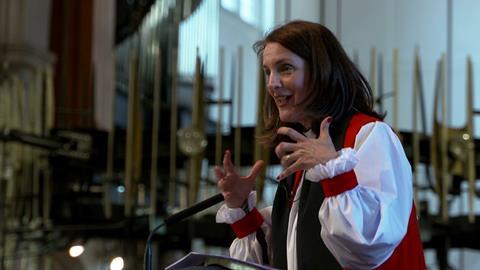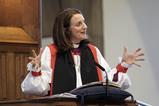As the Lambeth Conference draws to a close, Bishop Jill Duff urges her fellow Anglicans to let go of the “spirit of religion” and instead take hold of the opportunities to share the good news of the gospel

Many bishops have reached for the language of hope, in response to Justin Welby’s speech during the Call on Human Dignity, a signature moment of the Lambeth conference.
As I’ve already written here, we experienced an extraordinary left-field experience of the Holy Spirit pouring hope into our hearts in that room. He opened an umbrella of hope. Yes, there are many questions, but the future is unwritten.
As the Lambeth Conference draws to a close, here’s my start on a narrative of hope for those who, like me, hold a traditional-orthodox view of marriage. Framed round “faith, hope and love” from the popular reading in wedding services (1 Corinthians 13.13)
Faith
Cynicism is easy. The Pharisees were endlessly cynical, questioning at every turn. It was inevitable that there would be a parallel conference on social media, run by those not in the room.
The experience on the inside has been rather different.
I have met giants of faith from across the globe, carrying the fire of God’s love in war-torn situations of persecution, corruption and opposition. I have read a Diocesan Annual Report which made me weep. Extraordinary faith which is seeing Christ-centred, Holy Spirit-filled and holistically transformed lives and communities in the poorest parts of the world.
When Leslie Newbiggin returned to Britain from India in the 1970s he said: “Britain is covered in a blanket of unbelief”. How can we catch this fiery faith to see lives and communities transformed in our sleepy Western culture? A culture which, post-pandemic, is waking up hungry for the gospel. What if it were mission that again unites our Anglican Communion – to reach the people round here, from every nation, tribe, people and language - with the good news of Jesus?
Hope
Fear is inevitable. Pilate went against everything his conscience (and wife) advised him, because he was afraid of the people (John 19.8).
The church has always been about to fall to bits! The work of God is always fragile. It is beyond heart-breaking to encounter the fragility of many, including LGBT people, across the globe. I have hope that the light of Jesus can shine through our own brokenness, as we reach out to the most fragile people in our communities.
The Archbishop of Canterbury said clarity takes time: “Truth and unity must be held together, but church history also says that this sometimes takes a very long time to reach a point where different teaching is rejected or received.”
Similarly realistic was Bishop George Selwyn, one of my heroes of church planting, who helped catalyse new Christian communities across many of the Polynesian islands in the 19th century. He had a wonderfully pragmatic approach: “But how, you will ask, shall the truth of doctrine be maintained if we tolerate in the mission-field every form of error, and provide no safeguard for the purity of the faith? I answer that, as running water purifies itself, so Christian work is seen to correct its own mistakes”.
Lambeth has challenged me to go deeper in the living waters of his Spirit. His creativity is beyond my wildest imagination. He is more than able to translate the good news of Jesus, so that one day there will be people from every nation, tribe, people and language worshipping before his throne (Revelation 7:9). Let’s keep our eyes on his horizon of hope.
Love
Judging is instinctive. Especially when we encounter people different from us. Jesus warned: “Do not judge, or you too will be judged” (Matthew 7.1). The Holy Spirit convicts, God judges. It’s not my job – I only have the capacity to sense his judgement on me. But as a bishop, I have promised to teach and “refute error” (Titus 1:9), to be “steadfast as a guardian of the faith” once delivered to the saints.
Let’s not be distracted by that old enemy of Jesus, the “spirit of religion”, who takes condemning people into his own hands. During our bishop’s retreat, it was beyond moving to pray in the Huguenot Chapel in the crypt at Canterbury Cathedral. My grandmother’s Huguenot ancestors, the Pettit’s, were Protestants who fled persecution in France in the 16th century. The “spirit of religion” condemns, divides and conquers. Let’s keep the main thing the main thing. The opportunities for the gospel in the West at the moment are astonishing. Our culture is waking up.
Jesus’ heart was filled with compassion when he saw crowds who were harassed and helpless, like sheep without a shepherd (Matthew 9.36). How can our hearts burn with same loving agony in the heart of God, who is longing for his missing sons and daughters to come home, safe at last?
The future is unwritten
This is a slogan I have shamelessly stolen from the International Punk Festival ’Revolution’, held at the Winter Gardens in Blackpool last week. I was the special guest. (It’s a long story!).
The religious teachers of Jesus’ day, were trying to make sense of obeying God in the complex culture they lived in. But Jesus challenged them: “you do not know the scriptures or the power of God” (Matthew 22.29; Mark 12.24)
Like the vast majority of Anglicans, I believe Jesus’s teaching on marriage is clear, as is the New Testament’s plain teaching on sex belonging within marriage, which was distinct from the culture of the day. My job as a bishop is to teach the scriptures, pray for the power of God, and trust in God’s heart of compassion which aches for all his lost children to come back home.
How can we write the future, speak the future, think the future, work for the future, and above all pray for his future? How can we share the fellowship of the Spirit? Or dare I translate it, the communion of his Holy Spirit?
The future is unwritten. May we write it in big letters, fired by his Spirit. May we carry the good news of Jesus to all people everywhere. He is able to do immeasurably more than all we can ask or imagine. (Ephesians 3:20)





































2 Readers' comments